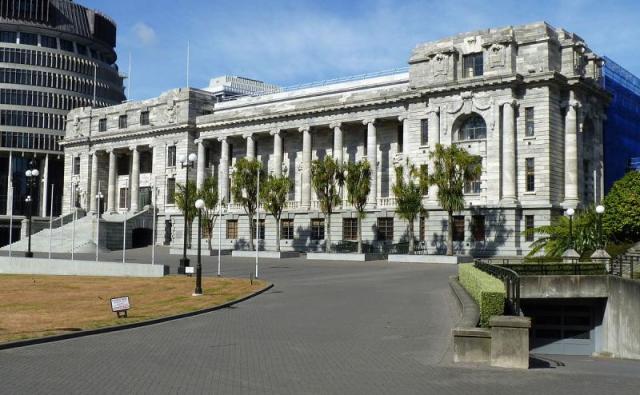Submissions open on Counter-Terrorism legislation
Fri 11 Jun 2021
The Justice Committee is inviting public submissions on the Counter-Terrorism Legislation Bill.

The closing date for submissions is 25 June 2021.
The bill was introduced in April 2021 as part of the government's wider response to the terrorist attack on Christchurch masjidain. The purpose of the bill is to better prevent and respond to terrorism and associated activities. It proposes to amend the Terrorism Suppression Act 2002, the Search and Surveillance Act 2012, and the Terrorism Suppression (Control Orders) Act 2019.
Justice Minister Kris Faafoi said "The Bill responds to the changing nature of terrorism internationally and domestically. Our laws need to recognise and provide a framework to allow early intervention, including against those who operate outside organised terrorist groups."
The bill proposes a number of changes including:
- "clarify the definition of a “terrorist act”;
- create a new offence to criminalise planning or preparation for a terrorist act;
- create a new offence to specifically criminalise terrorist weapons and combat training for terrorist purposes;
- create a new offence for international travel to carry out terrorist activities;
- expand the criminal offence of financing terrorism to include broader forms of material support; and
- extend the eligibility for a control orders to include individuals who have completed a prison sentence for a terrorism-related offence if they continue to present a real risk of engaging in terrorism-related activities."
Advocate Anjum Rahman has said the proposed approach to widen the definition of terrorism "won’t make us safer". She writes that "Unfortunately, the way legislation is applied is in a context of discrimination and marginalisation." She highlights
"That can most clearly be seen in Clause 5 of the bill, which amends definitions of sanctioned organisations using the United Nations Security Council’s designated sanctions list of terrorist entities. The problem is that the UN list does not include a single white supremacist, white nationalist, alt-right or neo-Nazi organisation.
Even though there have been so many mass shootings by these groups, the definitions of terrorism used by the UN means that these organisations can often continue to elude authorities. This is symptomatic of an international bias that also impacts us here in Aotearoa."
Anjum also raises concerns that the proposed changes give wider powers to the state and "...marginalised communities unfairly bear the brunt of state power." She goes on to say the new powers proposed by the legislation "...would not have helped to prevent the Christchurch mosque attacks. The issue wasn’t that the laws weren’t broad enough to prosecute the terrorist prior to the atrocities he committed. The problem was that our national security system didn’t recognise him as a threat – even when he came to the attention of state agencies, even when he travelled in and out of the country and even when he applied for a gun licence. The killer wasn’t ever on the radar."
She calls for inclusion of human rights checks and legislative requirements to monitor and address unfair bias. She writes "What will make us safer is a national security system that is not biased, that picks up on global emerging trends, and that is responsive to reports from targeted communities. When the systems are poor, greater legislative powers lead to the risk of greater harm."
As reported by RNZ, the Security Intelligence Service (SIS) has introduced new terminology to talk about threats. The terminology, which has been adapted from a framework developed by their Canadian counterpart, includes “Faith Motivated extremism” to describe one end of the threat spectrum, and "Identity Motivated Violent Extremism" to describe the end that white supremacists inhabit.
According to SIS Director-General Rebecca Kitteridge, the new terminology “makes it clear that our concern is with violent extremists and terrorists of varying ideologies. Those threats should not be conflated with communities.”
However, according to Tim McScorley from the International Civil Liberties Monitoring Group in Ottawa, while there may be more attention being paid to white supremist groups since the change in terminology, there is little evidence that it has resulted in a change in the levels of surveillance experienced by Muslim communities in Canada. "There's nothing that clearly shows that they're lessening their focus on surveillance of Muslim communities."
For international research and resources on the links between violent extremism and violence against women see our previous news stories below.
Update: The Counter-Terrorism Legislation Bill passed its third reading at Parliament in September 2021. Following Royal Assent, it will come into effect from 4 October 2021. The Government announced the establishment of a National Centre of Excellence for Preventing and Countering Violent Extremism and launched at least 10 scholarships for master's students to research ways of countering and preventing terrorism, including issues like social cohesion and social equality.
Related news
In April 2021 Kris Faafoi Minister of Justice released cabinet papers that outline proposed legislative changes to address hate speech. This follows the Hate speech and hate crime related legislation paper from the Royal Commission of Inquiry into the terrorist attack on Christchurch masjidain. Part 9, Chapter 4 of the Royal Commission's final report also looks at areas for improvement in New Zealand's legal framework and Police practice to address hate crime and hate speech.
The Implementation Report on New Zealand’s National Action Plan on Women, Peace and Security 2015 – 2019 was published earlier this year. The report examines the progress on the National Action Plan (NAP) for the implementation of United Nations Security Council Resolution 1325 on Women, Peace and Security. The lead agencies responsible for the plan implementation are the Ministry of Foreign Affairs and Trade, Ministry of Defence, New Zealand Defence Force and New Zealand Police. The report notes that:
"CSGs [civil society groups] noted the absence of reference to Te Tiriti o Waitangi, and integration of the principles at its heart (i.e., Participation, Partnership and Protection) in the NAP, which align closely with the WPS [women, peace and security] pillars. They consider that for New Zealand to have credibility on the WPS agenda internationally, the NAP needs to ensure it is introspective on the relevance of the agenda domestically. Consideration of the protection of Māori and other women from violence in New Zealand, together with the role of Māori women in conflict prevention is a vital step towards incorporating Te Tiriti o Waitangi principles in the NAP. This also applies to the inclusion of Pacific communities and women in New Zealand’s programmes in the Pacific."
Related media
New laws passed to reduce terrorism risk and keep community safe, Beehive media release, 04.05.2023
Misogyny, Extremism, and Gun Violence, Everytown [USA], 13.01.2022
Counter-Terrorism Legislation Bill returns to Parliament, Beehive media release, 21.09.2021
Would harsher terrorism laws have prevented the mall attack?, The Spinoff, 04.09.2021
Auckland terror attack: PM says new terror laws will be passed this month, Stuff, 04.09.2021
‘I shouldn’t have to protect myself’, Newsroom, 17.06.2021
Christchurch Call and Countering Violent Extremism: helping or hindering?, 15.06.2021
Govt acts to protect NZers from harmful content, Beehive media release, 10.06.2021
Police team monitoring white supremacists, Waatea News, 04.06.2021
How the SIS missed the threat of the far right, Newsroom, 03.06.2021
Government under pressure over ‘concerning’ hate reform delay, Newsroom, 16.04.2021
Up to three years in prison for hate speech under reforms, Newsroom, 16.04.2021
Oversight office urged after moves to expand counter-terrorism laws, RNZ, 15.04.2021
Police pleased with new counter-terrorism legislation, Newstalk ZB, 14.04.2021
Balance lacking in surveillance trends - Security expert, RNZ, 09.04.21
Govt announces Arms Advisory Group members, RNZ, 06.04.2021
New Zealand's terror list needs to be expanded - experts, RNZ, 22.03.2021
Image: Anna Shvets from Pexels





